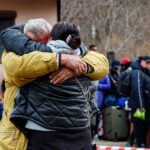Canada is now home to at least 44,615 Syrian refugees. Of these refugees, four out of five
are women and children. There is a clear need for an increase in mental health resources,
resource accessibility, and social connection for Syrian refugees. This paper describes a
Syrian refugee women’s embroidery program that provided both an accessible art therapy
group and a way for the participants to process feelings of hope and loss. Postgroup questionnaires
indicated that the women experienced a sense of pride and mastery over their
completed artwork, built new friendships and community, and felt connected to their homeland
through the embroidery. One-on-one interviews were held to collect the participants’
stories. The participants’ artwork and stories are summarized in this paper, and the stories
are available in full as supplementary material.
A Systematic Review on the Impact of Trauma-Informed Education Programs on Academic and Academic-Related Functioning for Students Who Have Experienced Childhood Adversity
The purpose of this study was to conduct a systematic review of the existing literature regarding trauma-informed education programs and their impact on academic and

